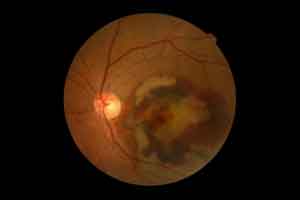- Home
- Editorial
- News
- Practice Guidelines
- Anesthesiology Guidelines
- Cancer Guidelines
- Cardiac Sciences Guidelines
- Critical Care Guidelines
- Dentistry Guidelines
- Dermatology Guidelines
- Diabetes and Endo Guidelines
- Diagnostics Guidelines
- ENT Guidelines
- Featured Practice Guidelines
- Gastroenterology Guidelines
- Geriatrics Guidelines
- Medicine Guidelines
- Nephrology Guidelines
- Neurosciences Guidelines
- Obs and Gynae Guidelines
- Ophthalmology Guidelines
- Orthopaedics Guidelines
- Paediatrics Guidelines
- Psychiatry Guidelines
- Pulmonology Guidelines
- Radiology Guidelines
- Surgery Guidelines
- Urology Guidelines
Genetic treatment for blindness may soon be reality

Patients who had lost their sight to an inherited retinal disease could see well enough to navigate a maze after being treated with a new gene therapy, according to research presented today at AAO 2017, the 121st Annual Meeting of the American Academy of Ophthalmology.
Patients in the study had a condition called Leber congenital amaurosis (LCA), which begins in infancy and progresses slowly, eventually causing complete blindness. This new, first-of-its-kind gene therapy is currently under review by the U.S. Food and Drug Administration for potential approval this year. There are currently no treatments available for inherited retinal diseases.
Ophthalmologist Stephen R. Russell, M.D., of the University of Iowa, is one of the lead researchers for this pioneering treatment. Data from the first randomized, controlled, phase 3 study showed that 27 of 29 treated patients (93 percent) experienced meaningful improvements in their vision, enough that they could navigate a maze in low to moderate light. They also showed improvement in light sensitivity and peripheral vision, which are two visual deficits these patients experience.
Approval could open the door for other gene therapies that could eventually treat the more than 225 genetic mutations known to cause blindness. It could be applied to retinitis pigmentosa, another inherited retinal disease caused by a defective gene. Or in the future, gene therapy could possibly provide key proteins needed to restore vision in more common diseases such as age-related macular degeneration.
LCA is rare, affecting about 1 in 80,000 individuals. It can be caused by one or more of 19 different genes. The treatment, called voretigene neparvovec (Luxturna, Spark Therapeutics), involves a genetically modified version of a harmless virus. The virus is modified to carry a healthy version of the gene into the retina. Doctors inject billions of modified viruses into both of a patient's eyes.
Treatment doesn't restore normal vision. It does, however, allow patients to see shapes and light, allowing them to get around without a cane or a guide dog. It is unclear how long the treatment will last, but so far, most patients have maintained their vision for two years.
More than 200 patients with LCA have participated in gene therapy trials since 2007. However, no gene therapy has gotten this close to FDA approval for retinal disease or any other eye disease. In October, an advisory committee to the FDA unanimously endorsed the treatment. The FDA isn't obligated to follow the recommendations of its advisory committees, but it usually does. The agency is expected to make its decision no later than January 2018.

Disclaimer: This site is primarily intended for healthcare professionals. Any content/information on this website does not replace the advice of medical and/or health professionals and should not be construed as medical/diagnostic advice/endorsement or prescription. Use of this site is subject to our terms of use, privacy policy, advertisement policy. © 2020 Minerva Medical Treatment Pvt Ltd